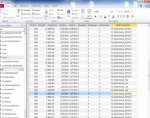businesshippieRH
Registered User.
- Local time
- Yesterday, 21:17
- Joined
- Aug 8, 2014
- Messages
- 60
I have a series of queries to get all of the information I'm looking for. Eventually, all of this information will go into a crosstab to show earnings across multiple jobs for each piece of equipment. However, I've hit a stumbling block.
I need to be able to do a dlookup using a result from a query to make the final query before crosstab.
I have a table whose sole purpose is to let access know which "RateSchedule" to use for a particular project. It has two columns: ID and RateScheduleTable. When a new RateScheduleTable is created, it adds the name of the newly created table to this table and gives it an autokey. These autokeys are then updated in my projects table so that the project is tied to a specific rate schedule.
For example (see below screenshot): 12, tbl_RateSchedule_Test
My current query pulls these names and puts it next to the transaction in question. The screenshot below shows a bit more of what I'm talking about:

I need a way to use these table names as a parameter in a dlookup in the next query to complete the information I need before making the crosstab. The bits I need to "pull" are highlighted in red.
Eg: Dlookup(DailyRate, tbl_RateSchedule_Test, Query4.EqTypeID=tbl_RateSchedule_Test.EqTypeID)
Thanks in advance! There may be a better way to do this too... I'm open to suggestion.
I need to be able to do a dlookup using a result from a query to make the final query before crosstab.
I have a table whose sole purpose is to let access know which "RateSchedule" to use for a particular project. It has two columns: ID and RateScheduleTable. When a new RateScheduleTable is created, it adds the name of the newly created table to this table and gives it an autokey. These autokeys are then updated in my projects table so that the project is tied to a specific rate schedule.
For example (see below screenshot): 12, tbl_RateSchedule_Test
My current query pulls these names and puts it next to the transaction in question. The screenshot below shows a bit more of what I'm talking about:

I need a way to use these table names as a parameter in a dlookup in the next query to complete the information I need before making the crosstab. The bits I need to "pull" are highlighted in red.
Eg: Dlookup(DailyRate, tbl_RateSchedule_Test, Query4.EqTypeID=tbl_RateSchedule_Test.EqTypeID)
Thanks in advance! There may be a better way to do this too... I'm open to suggestion.
